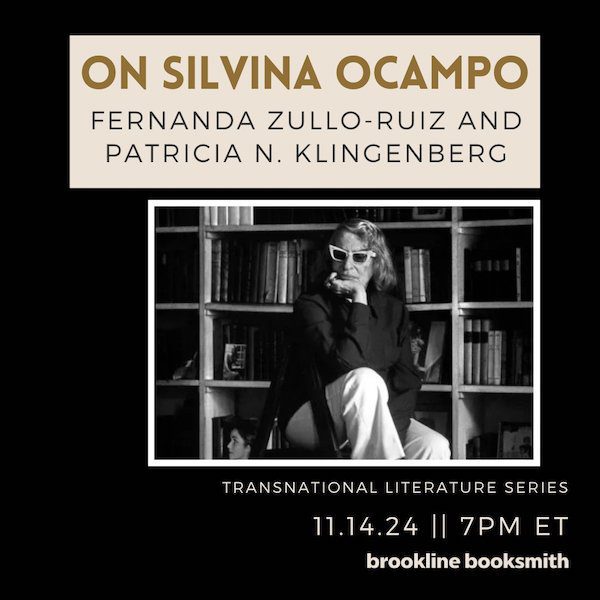
As part of University Press Week, Point Reyes Books (in collaboration with Third Place Books & the Transnational Literature Series at Brookline Books) will be hosting Fernanda Zullo-Ruiz & Patricia N. Klingenberg for a conversation about the life and work of Argentinian writer Silvina Ocampo. Find more about the event here.

Silvina Ocampo scholars: Fernanda Zullo-Ruiz & Patricia N. Klingenberg.
We are pleased to share this guide that Fernanda Zullo-Ruiz wrote for new readers of Ocampo’s work:
Faced with the wild universe created by the artistic powerhouse, Silvina Ocampo, where might readers begin with her literary works? A simple question, perhaps, but given her uniqueness in terms of form, voice, and themes, it requires small, strategic forays into her brilliant works. For her English-speaking audience, I will suggest a few readings in translation to survey her literary landscapes, starting with innocent stories and working up to more ambiguous or cruel texts.
“Forgotten Journey’ is the story of a little girl keen to learn where babies come from, until she does find out.
That innocuous innocence of childhood curiosity morphs in “The Clock House” and examines how a child’s classroom essay reveals the drunken cruelty of adults.
In a completely different and anxiety-producing tone, “The Mortal Sin” narrates the tragic religious and sexual ‘initiation’ of a young girl who will never find comfort or solace.
Other stories showcase Ocampo’s dark sense of humor: “Mimoso”, for example, tells of the beloved dog a woman simply cannot part with, and whose taxidermied body disturbingly becomes the subject of jokes, jealousy, and ultimately of sweet revenge.
Another humorous story, “The Lovers”, blends food and love and sex into absurd passionate encounters.
Two longer texts, “The Imposter” and “Cornelia Before the Mirror”, highlight Ocampo’s masterful hand at pushing the limits of ambiguity: readers question what is imagined and what is real in these narratives. A man sent to spy on another reports unsettling truths. A woman dialogues with a mirror as she contemplates suicide. At the end of both narratives, readers must retroactively adjust their interpretations of key events and details underpinning the texts.
Readers curious about her poetry should delve into “Buenos Aires” and “Jacaranda” to experience her vision of Argentina, and “Epitaph for a Jealous Woman”, “Song”, and “Vain Warning” to view her crafting of tumultuous passions.
Finally, if readers wish to explore one of Ocampo’s collaborations, the numerous twists and occasional humor of the detective novel co-written with Adolfo Bioy Casares, Where There is Love, There is Hate, will provide yet another perspective of Ocampo’s wide-ranging talent.
Overall, the unassuming power of Silvina Ocampo’s works—whether in her short stories, poetry, novels, or other genres—will further captivate new readers, especially as more posthumous works are published, and new translations in English become available.
Editor’s Note: These recommended poems, stories, and novellas can be found in English translation in one of four volumes: Thus Were Their Faces (New York Review Books, 2015), Forgotten Journey (City Lights, 2019), Where There is Love, There Is Hate (Melville House, 2013), or Silvina Ocampo (New York Review Books, 2015).
Fernanda Zullo-Ruiz is Professor of Spanish at Hanover College in Hanover, Indiana, and co-edited the first English-language book of essays by international Ocampo scholars with Patricia N. Klingenberg. Her monograph Motherhood and Childhood in Silvina Ocampo’s Works was published earlier this year.
